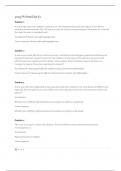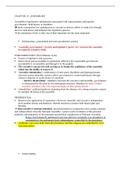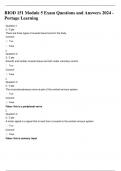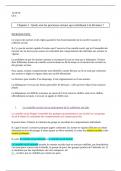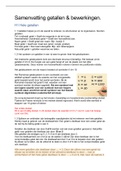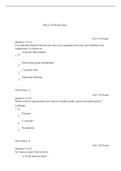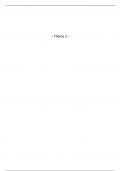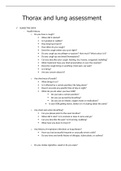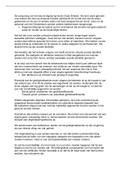UNISA DEPARTMENT OF PHILOSOPHY, PRACTICAL AND SYSTEMATIC THEOLOGY
TIC 3702 FAITH, PHILOSOPHY AND SCIENCE
JUNE 2020 EXAMINATION PORTFOLIO
COVID-19 is the time for healing of Natural-environment and Human beings in relation to God. With
this in mind, describe and discuss critically Prof E van Niekerk’s views on the theanthropocosmic
and anthropic-cosmological principles.
This paper gives a brief overview of Professor van Niekerk’s views on the theanthropocosmic and
anthropocosmic principles, followed by ‘n cursory look at the world views of Africa, the East and the
West. The next chapter uses the previous chapters and the author’s own experience as a mirror to
reflect critically on Professor van Niekerk’s views.
1
, UNISA DEPARTMENT OF PHILOSOPHY, PRACTICAL AND SYSTEMATIC THEOLOGY
TIC 3702 FAITH, PHILOSOPHY AND SCIENCE
JUNE 2020 EXAMINATION PORTFOLIO
1. INTRODUCTION
“Mom”, my son said about two months into the Covid-19 lockdown, “don’t you think God was
very clever in sending this virus?”
“Why?”, I responded.
“Because now the earth can heal and families can be together and people can see they’re not
so great.”
This insight from a fourteen-year old verbalised the thoughts that have been mulling inside my
own head. Many issues have been plaguing me during the last few years: Why am I lucky
enough to have every material need fulfilled, sometimes to a point of excess, while others
struggle just to have one meal a day? What should I do to change this …… but I’m only one
person and even if I do as Jesus commanded the rich young man in Matthew 19 and sell all I
have and give the proceeds to the poor, it would feed only ten families for a few months? And
why is mankind inclined to kill off whole species of plants and animals, and just as eager to fight
amongst themselves? If God intended man to look after nature; and intended Christians to be
the light of the world, why is nature deteriorating and the world becoming a seemingly darker
place by the week?
During the normal course of life these issues pop up, and may even warrant a “like” on Twitter
or a brief discussion with friends, but then it gets shut out by all the everyday assaults on our
attention. Covid-19 has changed this. Nearly everyone has been forced to stop in their tracks,
and have been obliged to rethink the way they do things, the way they experience the world,
their priorities, the validity of their beliefs, the value of their work, the nobility of their
aspirations. There is time enough for introspection and meditation. And how quickly did nature
reclaim urban spaces and start to correct the damage done by humankind through pollution?
The isolation has made us aware of the inborn human need for companionship, and the virus
has directly confronted us with issues of health, death, materialism and the continued existence
of the world. The past few months have therefore been the perfect time to read and
contemplate Professor van Niekerk’s Theanthropocosmic principle which deals with man’s
relationship with his Creator and with Creation - the very issues we were forced to face by Covid-
19 - and to research the opinions that scholars from other parts of the world have on this and
the anthropo-cosmological principle. As Professor van Niekerk himself said: “We should
periodically reflect on the quality and the sense-making integrity of the big processes we are
involved in as well as the seemingly insubstantial daily actions.” (Paraphrased from Van Niekerk,
2005:3.)
The academic works and philosophy conferences where such sense-making principles were
debated are now no longer the sole world in which the principles reside. Covid-19 has made
what was only theory to many, a necessary practical part of our daily lives and reflections: How
do we move from the old normal’s daily drudgery - only looking down at the next bit of road in
front of our feet and only very occasionally pausing to give thought to “higher” things like
religious differences or poverty or climate change - to a state where we make God, man and
nature an integral and inseparable part of our every experience, thought and deed?
2
TIC 3702 FAITH, PHILOSOPHY AND SCIENCE
JUNE 2020 EXAMINATION PORTFOLIO
COVID-19 is the time for healing of Natural-environment and Human beings in relation to God. With
this in mind, describe and discuss critically Prof E van Niekerk’s views on the theanthropocosmic
and anthropic-cosmological principles.
This paper gives a brief overview of Professor van Niekerk’s views on the theanthropocosmic and
anthropocosmic principles, followed by ‘n cursory look at the world views of Africa, the East and the
West. The next chapter uses the previous chapters and the author’s own experience as a mirror to
reflect critically on Professor van Niekerk’s views.
1
, UNISA DEPARTMENT OF PHILOSOPHY, PRACTICAL AND SYSTEMATIC THEOLOGY
TIC 3702 FAITH, PHILOSOPHY AND SCIENCE
JUNE 2020 EXAMINATION PORTFOLIO
1. INTRODUCTION
“Mom”, my son said about two months into the Covid-19 lockdown, “don’t you think God was
very clever in sending this virus?”
“Why?”, I responded.
“Because now the earth can heal and families can be together and people can see they’re not
so great.”
This insight from a fourteen-year old verbalised the thoughts that have been mulling inside my
own head. Many issues have been plaguing me during the last few years: Why am I lucky
enough to have every material need fulfilled, sometimes to a point of excess, while others
struggle just to have one meal a day? What should I do to change this …… but I’m only one
person and even if I do as Jesus commanded the rich young man in Matthew 19 and sell all I
have and give the proceeds to the poor, it would feed only ten families for a few months? And
why is mankind inclined to kill off whole species of plants and animals, and just as eager to fight
amongst themselves? If God intended man to look after nature; and intended Christians to be
the light of the world, why is nature deteriorating and the world becoming a seemingly darker
place by the week?
During the normal course of life these issues pop up, and may even warrant a “like” on Twitter
or a brief discussion with friends, but then it gets shut out by all the everyday assaults on our
attention. Covid-19 has changed this. Nearly everyone has been forced to stop in their tracks,
and have been obliged to rethink the way they do things, the way they experience the world,
their priorities, the validity of their beliefs, the value of their work, the nobility of their
aspirations. There is time enough for introspection and meditation. And how quickly did nature
reclaim urban spaces and start to correct the damage done by humankind through pollution?
The isolation has made us aware of the inborn human need for companionship, and the virus
has directly confronted us with issues of health, death, materialism and the continued existence
of the world. The past few months have therefore been the perfect time to read and
contemplate Professor van Niekerk’s Theanthropocosmic principle which deals with man’s
relationship with his Creator and with Creation - the very issues we were forced to face by Covid-
19 - and to research the opinions that scholars from other parts of the world have on this and
the anthropo-cosmological principle. As Professor van Niekerk himself said: “We should
periodically reflect on the quality and the sense-making integrity of the big processes we are
involved in as well as the seemingly insubstantial daily actions.” (Paraphrased from Van Niekerk,
2005:3.)
The academic works and philosophy conferences where such sense-making principles were
debated are now no longer the sole world in which the principles reside. Covid-19 has made
what was only theory to many, a necessary practical part of our daily lives and reflections: How
do we move from the old normal’s daily drudgery - only looking down at the next bit of road in
front of our feet and only very occasionally pausing to give thought to “higher” things like
religious differences or poverty or climate change - to a state where we make God, man and
nature an integral and inseparable part of our every experience, thought and deed?
2

